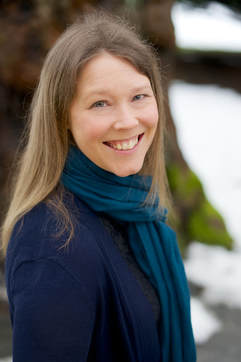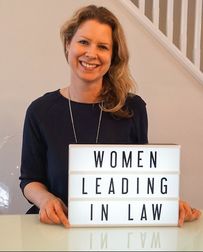 The next post in the series "Women Leading in Law" features Kim Hawkins the Executive Director of Rise Women's Legal Centre in Vancouver. Kim is a feminist lawyer who has used her legal skills to help low-income women and improve access to justice. Her non-traditional career path is a great inspiration and a reminder to lawyers and law students of how much you can do with your law degree and truly "make a difference". 1. Tell me a little about your practice or business. I am the Executive Director of Rise Women’s Legal Centre (Rise), a non-profit organization that operates a feminist legal clinic providing advice and representation to low-income women in British Columbia. Our main area of focus is family law, which is consistently identified as the largest unmet legal need for women and their dependent children in BC. We currently provide unbundled legal services for both Provincial and Supreme Court matters, but courtroom representation only in Provincial Court on select cases. Legal services at Rise are delivered primarily by upper-year law students from the Peter A. Allard School of Law at the University of British Columbia who spend a full academic term working at Rise. The students are temporarily articled by the Law Society of British Columbia and receive comprehensive training to assist them in their work with clients. Rise clients experience wide ranging barriers to access justice and, due to the poor state of access to justice in British Columbia, the need for our services vastly outstrips our capacity. Our clinic has run a waitlist since opening in May 2016; at the time of writing, we have 143 women waiting for service. In addition to serving a vulnerable population, Rise seeks to transform the legal profession through our alumni, many of whom state that they are more likely to work in family law and more likely to do pro bono work after completing our program. We work closely with many community partners, including the Peter A. Allard School of Law at UBC and West Coast LEAF, to share best practices and build a vibrant community of family law professionals. Rise is committed to taking action on the access to justice crisis through the direct provision of services. 2. Why did you go to law school? I stumbled into law school. I knew that I wanted to “make a difference” but I had little concept of what that meant. I knew that I wanted to make my living working in non-profits, but didn’t know what that would look like. 3. How did you get to where you are today? Design? Chance? Both? A little bit of both. I never expected to be the Executive Director of a women’s advocacy organization running a student clinic, and I feel incredibly lucky to have been in the right place at the right time when this opportunity came along. On the other hand, I could never have taken on this role if I hadn’t built a career in non-profits and social justice positions - for example through working in strategic public interest litigation in South Africa, through completing a Master’s degree in international human rights law, through volunteering on the Board of a women’s transition home, and through first-hand experience working with vulnerable clients as a staff legal aid lawyer in the north. All of those experiences together have given me the skills and critical analysis to work at Rise. I think that students graduating from law school who are interested in social justice work face a real challenge. They need to find articles and they need to find paid employment to finance their student debts, and some students are offered extremely prestigious opportunities that are next to impossible to turn down. But every choice creates its own momentum; it can be difficult to leave private practice and face lower salaries and different expectations later in a career. 4. What is your most significant achievement? What are you proud of? Opening Rise. Hands down. It’s so rewarding to work with our talented and enthusiastic law students and with the many brilliant social justice lawyers and advocates in our community. 5. What are some key challenges and opportunities for women in law? Despite all of our advances, women still face sexism in the workplace, and women with intersecting identities such as Indigenous women or women with disabilities face even greater discrimination. Sexism can rear its head without warning throughout a legal career - during articling applications when women have to suppress plans to have a family; at law firm parties where a senior colleague decides to be handsy; when clients refuse to take a woman’s advice seriously or believe that she won’t “fight” for them; when flexible schedules and part-time work are disregarded… and so much more. And yet, we continue to advance, and the more that we demand respect and recognition, and the more that we identify and discuss the ways in which women are challenged in law, the more legal culture will change. It’s exciting to be part of a moment in time when #MeToo has drawn so much attention to the way our culture at large has to change in order to create greater equality. To draw a quote from one of my favourite authors, Kenji Yoshino: … this generation of civil rights must move far beyond the law. While law can help us be more human in crucial ways, it will never fully apprehend us. We should not mourn this fact: it would be worrisome if law could capture us so handily. Law’s inability to apprehend our full human complexity, however, means our culture must do that work. Part of the work that we do at Rise is attempting to turn a feminist and systemic lens on all aspects of our practice. It’s always been important to me that we not just be a group of women lawyers who happen to do good legal work representing women, but that the staff and students at our clinic continually look for ways to practice law differently to better meet the needs of our clients. One key opportunity that I think all women should take advantage of is some form of mentorship - whether informally or through a formal mentorship program. For the vast majority of my career I have had access to exceptional women mentors who have been generous with their time and inspiring in their leadership – these women have taught me so much about what it means to be an advocate. 6. What advice would you give a woman starting her legal career? Never forget the idealism that brought you to law school. The experience of becoming a lawyer often feels limiting - legal culture is often conservative, hierarchical, and risk adverse, and it sometimes can feel that we have to follow a career path that has been set by someone else. It’s important to remember that, as lawyers, we are lucky to be in a career which has a lot of flexibility – we can set our own hours as a sole practitioner, fight for systemic change in a non-profit, improve policy working in government, or litigate at a major firm - or even just take the skills we have learned in law out into the world of non-law jobs. We can charge for our services or offer them pro bono. We can provide direct services to those who need them most or we can do systemic work and try to make the law work better for everyone. There are enough challenges out there in the world as well as people who will try to define us if we let them – so it’s important that we don’t create limitations for ourselves. If you hold on to your idealism, you will eventually find work that feels right for you, and law can be a great place to find it. ------------------------------------------------------------------------------------------------------------------------- Thank you Kim for agreeing to participate in this series. You can learn more about Kim and RISE here. Sign-up to receive these profiles directly in your in-box and stay tuned for the next profile in the series: Kathryn Manning, a founding partner of the brand new boutique litigation firm DMG Advocates LLP. The "Women Leading in Law" series focuses on good news stories and highlights amazing women succeeding in the legal profession. Each post includes the profiled lawyer's answers to six questions. Prepare to be inspired!
0 Comments
Your comment will be posted after it is approved.
Leave a Reply. |
Erin C. Cowling is a former freelance lawyer, entrepreneur, business and career consultant, speaker, writer and CEO and Founder of Flex Legal Network Inc., a network of freelance lawyers.
Categories
All
Archives
June 2024
|
|
(C) 2014-2024 Cowling Legal. All rights reserved.
|
Please note I am not currently practicing law.
Information on this website does not constitute legal advice and is for informational purposes only. Accessing or using this website does not create a solicitor-client relationship. See website Terms of Use/Privacy Policy. |







 RSS Feed
RSS Feed
